 Contractors face financial risks on every corner, and unquestioning contractors can quickly find that their pockets have been picked, and their hard work and efforts have been turned to nothing by unscrupulous people. Contractors need to be wise to these tricks and have systems in place to protect themselves. Who are these potential pickpockets? Who steals from contractors?Who could be stealing from your company?
What’s the cost of theft to contractors?Theft results in:
What contractors can do to prevent theftDon’t let your hard earned cash disappear out the door. There are steps that you can put in place.
Please share this post To read more about the author’s books and find out where you can purchase them visit the pages on this website by clicking the links below:
To read more about the author visit the page 'Paul Netscher' Want to contact Paul Netscher please enter your details on 'Contacts' Find out how Paul Netscher can help you
0 Comments
In the last video I discussed why construction variation claims may be bad for both the contractor and the client. Therefore, wherever possible steps should be taken to mitigate claims. Watch the video for steps to prevent claimable events occurring. 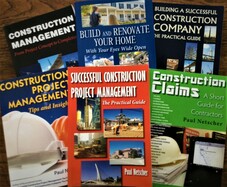 Information in this video is from the author's easy to read books: 'Construction Claims: A Short Guide for Contractors' and 'Successful Construction Project Management: The Practical Guide' and 'Building a Successful Construction Company: The Practical Guide'. All available from Amazon in paper or ebook. Next week watch video 19 - Variation claim notification Please Like, Share and Comment  Image courtesy of Serge Bertasius Photography at FreeDigitalPhotos.net Image courtesy of Serge Bertasius Photography at FreeDigitalPhotos.net I’m sure you’ve heard the saying ‘pay peanuts and you get monkeys’? Believe me. It’s true. So true, that’s why it’s important that you pay market-related salaries which are fair and sustainable and which will attract the right people. Our employees look around and compare their salary packages with what they can get elsewhere. But, in this competitive world, it’s impossible to retain people solely by paying higher salaries than competitors. There’s always another contractor, desperate for good people, who will willingly pay a premium to entice skilled people for a particular project. Therefore it’s imperative that quality candidates are attracted to the company and retained, for reasons other than salary. How to attract good people to your construction company and keep them.Here are some ways you can attract good people to your construction company and construction project - and most important keep them:
Conclusion.....Continue Reading.... This article was first published on the ClockShark website. To visit this website and continue reading the article click on the link above. Please share this post To read more about the author’s books and find out where you can purchase them visit the pages on this website by clicking the links below:
To read more about the author visit the page 'Paul Netscher' Want to contact Paul Netscher please enter your details on 'Contacts' Find out how Paul Netscher can help you Contractors assume that claims will be lucrative and that they’ll more than recover the cost and time of the delay. But this isn't always the case and there are downsides to claims as well. Watch the video for more. 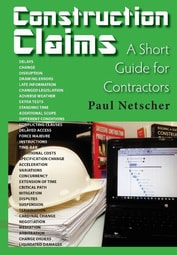 Information in this video is from the author's easy to read books: 'Construction Claims: A Short Guide for Contractors' and 'Successful Construction Project Management: The Practical Guide' and 'Building a Successful Construction Company: The Practical Guide'. All available from Amazon in paper or ebook. Next week watch video 18 - How to avoid variation claims or mitigate their impact. Please Like, Share and Comment  Image courtesy of stockimages at FreeDigitalPhotos.net Image courtesy of stockimages at FreeDigitalPhotos.net Contractors are only as good as their last mistake. So is their reputation. Unfortunately, most people remember faults and very few remember excellent work and successful projects. When asked which restaurants gave you good service or tasty food you’ll probably have to think, but if you’re asked which restaurant gave you bad service or poor food, you’ll probably recall the name instantaneously. Construction is similar, and clients remember errors long after they’ve been remedied. They can be unforgiving. Even when your price is the cheapest, but your reputation is poor (even undeservedly), you’re not going to awarded the construction project. One mistake can undo thousands of hours of hard work. That error may be caused by you or one of your employees. Even incidents you consider trivial can be problematic for the client. Furthermore, clients talk to each other and word of a poor reputation quickly spreads. It’s essential that all employees know the importance of delivering a quality construction project on time without safety, environmental or disciplinary breaches. Reputation is a team effort, and everyone (workers, supervisors and management) needs to understand how important it is that they portray the company in a good light, maintaining the contractor’s fine reputation in everything they do. What makes a construction company's reputation good?There are numerous factors that can build or destroy a contractor's reputation. These include:
Conclusion - a contractor's reputation is importantIt’s imperative that your company has a good reputation and that you’re always on guard to protect it. A poor reputation may result in your company losing projects, even when your price is the cheapest. In addition companies with a good reputation often attract good employees. Nobody wants to work for a company with a bad reputation. ....Continue Reading.... 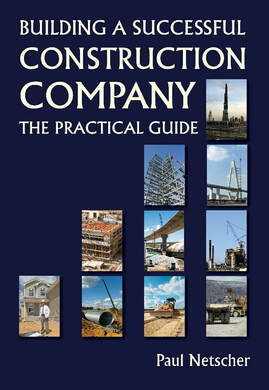 This article was first published on the ClockShark website. To visit this website and continue reading the article click on the link above. Please share this post To read more about the author’s books and find out where you can purchase them visit the pages on this website by clicking the links below:
To read more about the author visit the page 'Paul Netscher' Want to contact Paul Netscher please enter your details on 'Contacts' Find out how Paul Netscher can help you An introduction to construction variation claims video 16 - Documents required to support your claim13/1/2019 Extension of time and variation claims require supporting documentation. Failure to submit documents that support your claims could mean that the client rejects the claim. Watch the video for more. 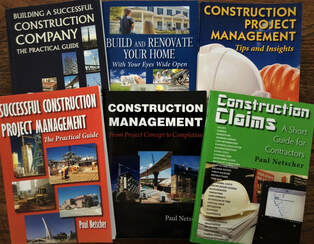 Information in this video is from the author's easy to read books: 'Construction Claims: A Short Guide for Contractors' and 'Successful Construction Project Management: The Practical Guide' and 'Building a Successful Construction Company: The Practical Guide'. All available from Amazon in paper or ebook. Next week watch video 17 - Why variations can be bad. Please Like, Share and Comment  Image courtesy of Naypong at FreeDigitalPhotos.net Image courtesy of Naypong at FreeDigitalPhotos.net Some people love using certain phrases, or have stock answers to questions and comments. These phrases are often used with little thought – just an excuse to do nothing, a meaningless answer, or a go-to phrase. Here are a few phrases I hate hearing on construction projects. I’m sure you have phrases that you dislike? 1.“He is useless” (or maybe she). / Frequently used to complain about someone, or even used as an excuse for a failure on the construction project (blaming someone else for the failure). = Well why is that person still working here if they are useless? What have you done about it? Have you told them where they need to improve? Have you provided adequate training? 2. “Don’t bring me problems, bring me solutions”. (or, “there’s no such thing as a problem, there’s only a solution”.) / This comes after asking the boss for help! = If I had a solution I wouldn’t have asked for help! If there wasn’t a problem I wouldn’t need a solution. Let’s not play semantics, either you can help or you can’t. Personally, I’d rather someone brought a problem (or potential problem) to my attention and asked for help before it got out of hand. Sure we expect people to solve simple problems, we may expect managers to have thought of possible solutions, but surely we’ve employed people that we know we can trust to solve most everyday problems on their own, only bringing us problems when they need our help? 3. “We have always done it like this” (or; “we always do it like that”). / In reply to a suggestion on doing something differently, maybe a different construction method or using alternative construction material. Frequently used as an excuse not to embrace new construction technology. = Change is often good. There are often new and innovative ways of doing things, new construction techniques. Maybe the way you have always done things is the best, but you don’t know until you have considered the alternative construction solutions and methods. 4. "I’ll do it/that” – and it doesn’t get done. / In reply when you ask somebody to do something, to carry out a task. = Don’t you hate it when people say they’ll do something and then don’t do it? If you don’t want to quote for the construction project then tell me, don’t keep me hanging expecting a price. If you’re not going to do something I asked you to do, tell me, then I can make alternative arrangements. 5. “No one will notice” (or; “It doesn’t matter, no one will notice”). / Often said as an excuse for poor quality construction work. = Well I noticed! Hey, take pride in your work. Anyway, I can recall countless times someone has said that, then at the end of the day someone has noticed. If there’s a problem fix it, it usually costs a whole lot more to fix the problem at the end of the project when the client puts in on the snag or punch list, than it does to correct it now. 6. “Those are the rules” (or, “that’s what the boss wants”). / Usually said in defence of a request, or a refusal to do something. Often a justification for being obstinate or unhelpful (maybe even lazy). = Some people love to hide behind rules, or other people. Sure rules are important, but it’s equally important to ensure that the rules are fair and applied in a fair manner. Also, are those really the rules, or are you just clutching at an excuse? 7. “Fix it or you are out/fired/dismissed.” / Frequently used when a construction project is losing money. = Sure, threats are going to work? When there’s a problem, employees need to stay motivated, they require help and support. Threats are demoralising and seldom yield the desired result. Sure, sometimes the person has goofed up, they’ve caused the problem, they may need to be reprimanded, but, it’s usually far more important to get the problem fixed properly first. 8. “So and so, or company X, is worse than us.” Or, “we are better than company X”. / This in response to a criticism, or a suggestion on how thing should be done better. = Why can’t we do things right, as they should be? Why should it be correct just because someone else is worse than us? Why do we measure ourselves against the worst construction company or an ordinary construction project, when in fact we should be striving to be the best? 9. “We don’t have time (or, money) for training.” (Or,” if we train them, improving their qualifications, they’re going to want a higher salary,” or, “they will leave the company if we train them”.) / Usually in reply to a request to attend a training course, or an excuse for having poorly skilled construction workers. = Companies always have an excuse why they don’t train people. But improving our team’s skills benefits the company and motivates workers. A skilled team will yield results – I’ve always got huge benefits from improving the skills of my team. There will never be time for training unless we make the time. There will never be money for training unless we budget for it. 10. “Safety is a waste of time and/or money”. (Or, “we don’t have time for safety”.) / Used as an excuse for poor safety practices on construction projects. = Safety does not have to cost additional time and money, in fact good safety practices saves time and money. But anyway, is a person’s limb, eye, or life more important than time or money? We owe it to our employees to ensure they return home safely at the end of every day. Conclusion Think before you use some of these phrases. Are you being helpful? How do these phrases make you feel? What phrases do you hate in construction? 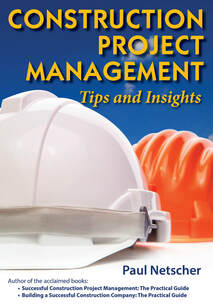 This article is adapted from information in the author’s popular books: 'Successful Construction Project Management: The Practical Guide' and 'Building a Successful Construction Company: The Practical Guide' and 'Construction Project Management: Tips and Insights' 'Construction Claims: A Short Guide for Contractors' is another of Paul's useful books. Paul has recently published 'Construction Management: From Project Concept to completion'. Paul's new book: 'Build and Renovate Your Home With Your Eyes Wide Open' is for those with little construction experience who want to build or renovate a house. It's filled with tips and suggestions to help you on your way, ensuring you avoid the pitfalls of home construction projects. These books are available on Amazon and other online book stores. Paul publishes articles regularly on LinkedIn and his website. Paul writes regular articles for other websites, gives lectures, mentors, and is available for podcasts and interviews. © 2019 This article is not to be reproduced for commercial purposes without written permission from the author. Any instruction of a contractual nature, which changes details and specifications, or which could cause a delay or additional costs must be in writing.  Information in this video is from the author's easy to read books: 'Construction Claims: A Short Guide for Contractors' and 'Successful Construction Project Management: The Practical Guide' and 'Building a Successful Construction Company: The Practical Guide'. All available from Amazon in paper or ebook. Next week watch video 16 - Supporting documents required to ensure your variation claim is successful. Please Like, Share and Comment New Year’s resolutions for successful construction projects and a profitable construction company4/1/2019 2019 – A New Year – make it the best construction year ever  2018, where did it go so fast? The last few years have been tough for many. Some of you will look back on 2018 and curse the gods of construction that were against you, subcontractors that let you down, the weather, politicians, uncooperative clients, competitors that undercut your prices, employees, the economy, in fact usually everybody and anyone. But this serves little purpose. The end of the year is a time to contemplate the past year and consider the coming year. It’s that time of year when many make New Year’s resolutions. These include; getting fit, losing weight, stopping smoking, drinking less, taking up a new hobby, managing stress, changing jobs and spending more time with the family. Unfortunately, few successfully keep these resolutions because they’re often poorly thought through, spur of the moment decisions (sometimes made after a few drinks), or because they just seemed like the right thing to say and do. There’s no plan on how to go about keeping the resolution. So other than providing some optimism and a brief feeling of good, they often achieve little. What will you be wishing for in 2019? No doubt you are wishing for company growth, increased profits, successful projects, a developing career, more family time, good health, less stress and a year with few problems. But have you really thought how you’ll achieve these aims? Do you have a plan? How will you make 2019 better than 2018? Before you get totally immersed in the hassles, problems and work in the New Year, take some time to consider things you could improve in your company, your projects and your everyday life. Why not put some New Year’s resolutions in place, and keep them. Try these construction resolutions in 2019
Conclusion – an inspired and successful 2019 Don’t let another year go past without making a few necessary changes. Before we know it 2019 will be half gone! Take action now on just a few of these points and you’ll certainly be able to look back at the end of 2019 with a sense of achievement. Write down the resolutions you want to implement. Include a short plan on how you’ll tackle them. Then, don’t forget to monitor progress through the year. Make this year a new beginning. Don’t let this become another forgotten New Year’s resolution! You can make the difference with some planning and a little effort. How do you plan to transform your company, your construction projects and your career this year? Please share your thoughts. If you put some of these ideas into practice please don’t forget to give us feedback on how they helped you. Wishing you an inspired, happy, healthy and successful 2019. Thank you for your continued support. Please like, share and comment. 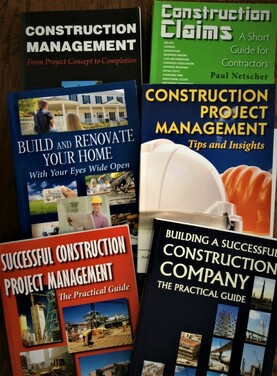 This article was first published on the ClockShark website. To read more about the author’s books and find out where you can purchase them visit the pages on this website by clicking the links below:
To read more about the author visit the page 'Paul Netscher' Want to contact Paul Netscher please enter your details on 'Contacts' Find out how Paul Netscher can help you The Construction Contract Document - all the rules of the project. Regrettably many contractors only read the contract document when there’s a claimable event or when they’re in trouble. Often by then it’s too late! What does your contract document say? 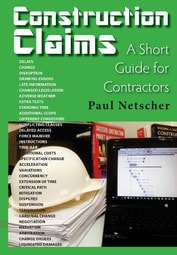 Information in this video is from the author's easy to read books: 'Construction Claims: A Short Guide for Contractors' and 'Successful Construction Project Management: The Practical Guide' and 'Building a Successful Construction Company: The Practical Guide'. All available from Amazon in paper or ebook. Next week watch video 15 - Project Site Instructions - what you should know.
Please Like, Share and Comment |
Archives
June 2024
Note: We welcome genuine comments, especially comments that add additional information to the subject matter in the article. We however reserve the right to remove inappropriate comments, which includes comments that have nothing to do with the subject, comments that include inappropriate language, and comments that are an advertisement for a product or company, or which include an advertising link. Comments must be in English. We will not enter into discussion on why a particular comment was removed.
CategoriesCopyright 2016 - The attached articles cannot be reproduced for commercial purposes without the consent of the author.
The opinions expressed in the attached articles are those of the writer. It should be noted that projects are varied and different laws and restrictions apply which depend on the location of the contractor and the project. It's important that the reader uses the supplied information taking cognisance of their particular circumstances. The writer assumes no responsibility or liability for any loss of any kind arising from the reader using the information or advice contained herein. "I have what I consider some of the best books on construction management."
Books are available from: Amazon.com Amazon.co.uk takealot.com kalahari.com Amazon.in Amazon.de Amazon.fr Amazon.it Amazon.com.au Powell's Fishpond uread bokus Amazon.ca Amazon.es Other retail stores Available in paperback or on Kindle "28 YEARS OF CONSTRUCTION PROJECT MANAGEMENT EXPERIENCE, DEVELOPING SUCCESSFUL CONSTRUCTION PROJECT MANAGERS AND BUILDING SUCCESSFUL CONSTRUCTION COMPANIES"
|






 RSS Feed
RSS Feed




